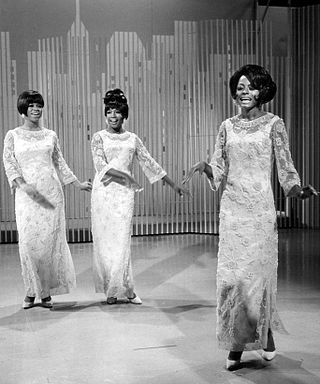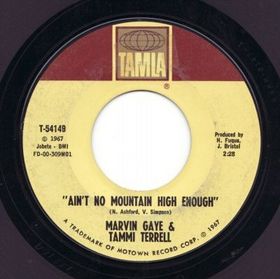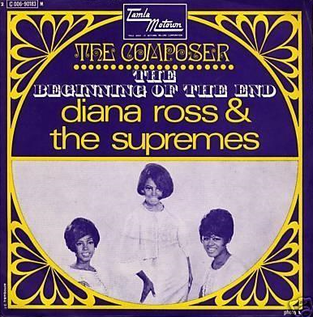Velma Jean Terrell is an American R&B and jazz singer. She replaced Diana Ross as the lead singer of The Supremes in 1970.
"Someday We'll Be Together" is a song written by Johnny Bristol, Jackey Beavers, and Harvey Fuqua. It was the last of twelve American number-one pop singles for Diana Ross & the Supremes on the Motown label. Although it was released as the final Supremes song featuring Diana Ross, who left the group for a solo career in January 1970, it was recorded as Ross' first solo single and Supremes members Mary Wilson and Cindy Birdsong do not sing on the recording. Both appear on the B-side, "He's My Sunny Boy".

"Reflections" is a 1967 song recorded by American soul music group The Supremes for the Motown label. The single release was the first Supremes record credited to "Diana Ross and the Supremes", and the song was one of the last Motown hits to be written and produced by Holland–Dozier–Holland before they left the label.

"Stoned Love" is a 1970 hit single recorded by The Supremes for the Motown label. It was the last Billboard Pop Top Ten hit for the group, peaking at number seven, and their last Billboard number-one R&B hit as well, although the trio continued to score top ten hits in the UK into 1972. In the UK, it was the post-Ross Supremes' biggest hit, reaching number 3 in the singles chart. The single spent six weeks in the UK top ten and five weeks in the US top ten. The BBC ranked "Stoned Love" at number 99 on The Top 100 Digital Motown Chart, which ranks Motown releases solely on their all time UK downloads and streams.

"Love Child" is a 1968 song released by the Motown label for Diana Ross & the Supremes. The second single and title track from their album Love Child, it became the Supremes' 11th number-one single in the United States, where it sold 500,000 copies in its first week and 2 million copies by year's end.

"I Hear a Symphony" is a 1965 song recorded by the Supremes for the Motown label.

American girl group The Supremes have released 29 studio albums, four live albums, two soundtrack albums, 32 compilation albums, four box sets, 66 singles and three promotional singles. The Supremes are the most successful American group of all time, and the 26th greatest artist of all time on the US Billboard charts; with 12 number-one songs on the Billboard Hot 100 and three number-one albums on the Billboard 200. The Supremes were the first artist to accumulate five consecutive number-one singles on the US Hot 100 and the first female group to top the Billboard 200 albums chart with The Supremes A' Go-Go (1966). In 2017, Billboard ranked The Supremes as the number-one girl group of all time, publishing, 'although there have been many girl group smashes in the decades since the Supremes ruled the Billboard charts, no collective has yet to challenge their, for lack of a better word, supremacy.' In 2019, the UK Official Charts Company placed 7 Supremes songs—"You Can't Hurry Love" (16), "Baby Love" (23), "Stop! In the Name of Love" (56), "Where Did Our Love Go?" (59), "You Keep Me Hangin' On" (78), "Come See About Me" (94) and "Stoned Love" (99)—on The Official Top 100 Motown songs of the Millennium chart, which ranks Motown releases by their all-time UK downloads and streams.

"I'm Gonna Make You Love Me" is a soul song most popularly released as a joint single performed by Diana Ross & the Supremes and the Temptations for the Motown label. This version peaked for two weeks at No. 2 on the Hot 100 in the United States, selling 900,000 copies in its first two weeks, and at No. 3 on the UK Singles Chart in January 1969.

"Ain't No Mountain High Enough" is a song written by Nickolas Ashford & Valerie Simpson in 1966 for the Tamla label, a division of Motown. The composition was first successful as a 1967 hit single recorded by Marvin Gaye and Tammi Terrell, and became a hit again in 1970 when recorded by former Supremes frontwoman Diana Ross. The song became Ross's first solo number-one hit on the Billboard Hot 100 chart and was nominated for the Grammy Award for Best Female Pop Vocal Performance.

"Reach Out and Touch (Somebody's Hand)" is the debut solo single of singer Diana Ross, released in April 1970 as the first single from her solo self-titled debut 1970 album by Motown Records.

"I'm Livin' in Shame" is a 1969 song released for Diana Ross & the Supremes on the Motown label. The sequel to the Supremes' number-one hit, "Love Child," the song peaked in the top ten on the US Billboard Hot 100 pop chart at #10 and the top 20 in the UK at #14 in April and May 1969.

"I Second That Emotion" is a 1967 song written by Smokey Robinson and Al Cleveland. First charting as a hit for Smokey Robinson and the Miracles on the Tamla/Motown label in 1967, "I Second That Emotion" was later a hit single for the group duet Diana Ross & the Supremes and the Temptations, also on the Motown label.

Right On is the nineteenth studio album by The Supremes, released in 1970 for the Motown label. It was the group's first album not to feature former lead singer Diana Ross. Her replacement, Jean Terrell, began recording Right On with Mary Wilson and Cindy Birdsong in mid-1969, while Wilson and Birdsong were still touring with Ross.

The Magnificent 7 is a collaborative album combining Motown's premier vocal groups, The Supremes and The Four Tops. Issued by Motown in 1970, it followed two collaborative albums The Supremes did with The Temptations in the late 1960s. The album featured their hit cover of Ike & Tina Turner's "River Deep – Mountain High", which reached number 14 on the US Billboard Hot 100 singles chart. In the UK, the album peaked at number 6. In December 1971, Billboard reported UK album sales of 30,000 copies.

"Floy Joy" is a song written by Smokey Robinson and released as a single in December 1971 by popular Motown female singing group The Supremes.

"Automatically Sunshine" is a song written by Smokey Robinson and released as a single by Motown singing group The Supremes as the second single from their popular album Floy Joy in 1972.

"The Composer" is a 1969 song released for Diana Ross & the Supremes by the Motown label.

"Everybody's Got the Right to Love" is a socially conscious–inspired pop song written by Lou Stallman, produced by Frank Wilson and released as a single in 1970 by Motown group The Supremes, who took the song into the top forty in mid-1970 following the release of "Up the Ladder to the Roof".

"Touch" is a soft ballad written by Pamela Sawyer and Frank Wilson, who also produced it as a single for Motown recording group The Supremes, who issued it as a single in 1971.

“You Gotta Have Love in Your Heart” is a duet single between Motown singing groups The Supremes and the Four Tops, released as a single from their The Return of the Magnificent 7 album in 1971. The single became a modest charter peaking at #55 on the U.S. Billboard Hot 100 chart and #41 on the U.S. Billboard R&B Singles Chart. The single fared better in the UK, where it reached #25 in the official top 50 single chart. Lead vocals were by the groups' respective lead singers Jean Terrell and Levi Stubbs.


















